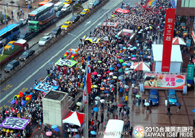A survey of over 2,000 gay men and lesbians conducted earlier this month in Taiwan has revealed that 29 percent said they had contemplated suicide, with 18 percent having attempted to take their own life.

The results which was released on Tuesday has since been picked up by various local media including Focus Taiwan and Taipei Times as well news agency AFP.
Wang Ping, secretary-general of GSRT, was quoted in Focus Taiwan as calling on the Ministry of Education to quickly do what "should have been done" – put gay issues on the curriculum – as stipulated in the Gender Equity Education Act.
The Act, passed in 2004, bans gender discrimination in schools in Taiwan and stipulates that school curriculums should include gender equality education.
According to the Taipei Times, the Ministry of Education was scheduled to introduce gender-equality education — including the subject of homosexuality — into the curriculum for elementary and junior-high schools on August 1 last year.
However, religious organisations fought its implementation by pressuring legislators and the ministry to drop the plan, the alliance which conducted the survey said, accusing the ministry of violating the Gender Equality Education Act (性別平等教育法) and of administrative delinquency.
In response, Yang Yu-hui (楊玉惠), a ministry official, said that gender equality education has already been incorporated into the curriculum of the nation’s Nine-Year Educational Program.
What the survey found (as reported by Focus Taiwan):
- 79 percent of respondents worry that their family would not accept their sexual orientation.
- 68 percent of homosexuals feel pressured by family expectations that they will enter into heterosexual marriages.
- more than 20 percent of the respondents also said they did not have any gay-friendly friends, classmates or teachers, nor had they been exposed to gay-friendly books, websites or media before the age of 18. This means that homosexual youngsters grow up feeling helpless and isolated, according to the alliance.
- 58 percent of the respondents said they had been subjected to some forms of violence, with verbal abuse being the most common (91 percent), followed by social exclusion (54 percent), physical violence (14 percent) and sexual abuse (3 percent).
